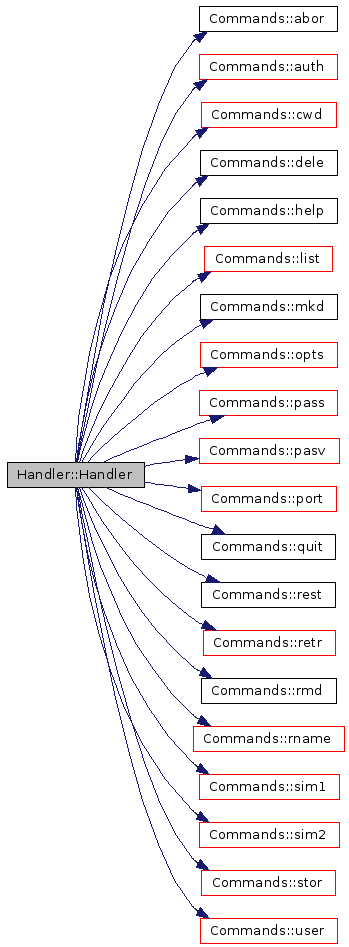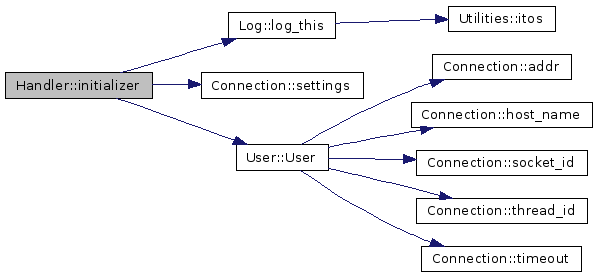DocumentationGenerated on Thu Aug 31 00:02:39 2006 |
|||||||||||||||||||||||||||||||||||||||||||||||||||||||||
Handler Class Reference#include <Handler.h>
Detailed Description
Definition at line 44 of file Handler.h. Constructor & Destructor Documentation
Definition at line 19 of file Handler.cpp. References Commands::abor(), Commands::auth(), BEFORE_USER, cmd_info, COM_APPE, COM_CCC, COM_CDUP, COM_CONF, COM_CWD, COM_ENC, COM_EPRT, COM_EPSV, COM_FEAT, COM_FROM, COM_LONG, COM_MDTM, COM_MIC, COM_MLSD, COM_MLST, COM_MODE, COM_NOOP, COM_PASV, COM_PBSZ, COM_PORT, COM_PROT, COM_PWD, COM_SHORT, COM_SIZE, COM_STOR, COM_STRU, COM_SYST, COM_TO, COM_TYPE, config, Commands::cwd(), Commands::dele(), Configuration::general, Commands::help(), HLP_ABOR, HLP_APPE, HLP_AUTH, HLP_CCC, HLP_CDUP, HLP_CWD, HLP_DELE, HLP_EPRT, HLP_EPSV, HLP_FEAT, HLP_HELP, HLP_LIST, HLP_MDTM, HLP_MKD, HLP_MLSD, HLP_MLST, HLP_MODE, HLP_NLST, HLP_NOOP, HLP_OPTS, HLP_PASS, HLP_PASV, HLP_PBSZ, HLP_PORT, HLP_PROT, HLP_PWD, HLP_QUIT, HLP_REST, HLP_RETR, HLP_RMD, HLP_RNFR, HLP_RNTO, HLP_SIZE, HLP_STOR, HLP_STRU, HLP_SYST, HLP_TYPE, HLP_USER, Commands::list(), Commands::mkd(), Commands::opts(), Commands::pass(), Commands::pasv(), Commands::port(), Commands::quit(), general_stru::readonly, Commands::rest(), Commands::retr(), Commands::rmd(), Commands::rname(), Commands::sim1(), Commands::sim2(), Commands::stor(), and Commands::user(). 00020 { 00021 // first argument is number of arguments to the command, they should 00022 // be self explaining except the negative ones. -1 means any number, 00023 // -2 means anything but 0. 00024 // An empty hlp field means no help will be displayed about the command 00025 cmd_info["SYST"] = command_info(0, &Commands::sim1, COM_SYST, HLP_SYST); 00026 cmd_info["HELP"] = command_info(-1, &Commands::help, BEFORE_USER, HLP_HELP); 00027 cmd_info["RETR"] = command_info(-2, &Commands::retr, 0, HLP_RETR); 00028 // these commands are disabled if the conf variable readonly in general 00029 // sector is enabled. 00030 if(!config->general.readonly) 00031 { 00032 cmd_info["STOR"] = command_info(-2, &Commands::stor, COM_STOR, HLP_STOR); 00033 cmd_info["APPE"] = command_info(-2, &Commands::stor, COM_APPE, HLP_APPE); 00034 cmd_info["DELE"] = command_info(-2, &Commands::dele, 0, HLP_DELE); 00035 cmd_info["RNFR"] = command_info(-2, &Commands::rname, COM_FROM, HLP_RNFR); 00036 cmd_info["RNTO"] = command_info(-2, &Commands::rname, COM_TO, HLP_RNTO); 00037 cmd_info["MKD"] = command_info(-2, &Commands::mkd, 0, HLP_MKD); 00038 cmd_info["RMD"] = command_info(-2, &Commands::rmd, 0, HLP_RMD); 00039 cmd_info["XMKD"] = command_info(-2, &Commands::mkd, 0, HLP_MKD); 00040 cmd_info["XRMD"] = command_info(-2, &Commands::rmd, 0, HLP_RMD); 00041 } 00042 cmd_info["PORT"] = command_info(1, &Commands::port, COM_PORT, HLP_PORT); 00043 cmd_info["EPRT"] = command_info(1, &Commands::port, COM_EPRT, HLP_EPRT); 00044 cmd_info["PASV"] = command_info(0, &Commands::pasv, COM_PASV, HLP_PASV); 00045 cmd_info["EPSV"] = command_info(-1, &Commands::pasv, COM_EPSV, HLP_EPSV); 00046 cmd_info["PWD"] = command_info(0, &Commands::sim1, COM_PWD, HLP_PWD); 00047 cmd_info["CWD"] = command_info(-2, &Commands::cwd, COM_CWD, HLP_CWD); 00048 cmd_info["CDUP"] = command_info(0, &Commands::cwd, COM_CDUP, HLP_CDUP); 00049 cmd_info["LIST"] = command_info(-1, &Commands::list, COM_LONG, HLP_LIST); 00050 cmd_info["NLST"] = command_info(-1, &Commands::list, COM_SHORT, HLP_NLST); 00051 cmd_info["TYPE"] = command_info(-2, &Commands::sim1, COM_TYPE, HLP_TYPE); 00052 cmd_info["MODE"] = command_info(1, &Commands::sim1, COM_MODE, HLP_MODE); 00053 cmd_info["STRU"] = command_info(1, &Commands::sim1, COM_STRU, HLP_STRU); 00054 cmd_info["SIZE"] = command_info(-2, &Commands::sim2, COM_SIZE, HLP_SIZE); 00055 cmd_info["USER"] = command_info(1, &Commands::user, BEFORE_USER, HLP_USER); 00056 cmd_info["PASS"] = command_info(-2, &Commands::pass, BEFORE_USER, HLP_PASS); 00057 cmd_info["QUIT"] = command_info(-1, &Commands::quit, BEFORE_USER, HLP_QUIT); 00058 cmd_info["NOOP"] = command_info(0, &Commands::sim1, COM_NOOP, HLP_NOOP); 00059 cmd_info["MDTM"] = command_info(-2, &Commands::sim2, COM_MDTM, HLP_MDTM); 00060 cmd_info["FEAT"] = 00061 command_info(0, &Commands::sim1, COM_FEAT | BEFORE_USER, HLP_FEAT); 00062 cmd_info["MLST"] = command_info(-2, &Commands::sim2, COM_MLST, HLP_MLST); 00063 cmd_info["MLSD"] = command_info(-1, &Commands::list, COM_MLSD, HLP_MLSD); 00064 cmd_info["OPTS"] = command_info(-1, &Commands::opts, 0, HLP_OPTS); 00065 cmd_info["REST"] = command_info(1, &Commands::rest, 0, HLP_REST); 00066 cmd_info["XCWD"] = command_info(-2, &Commands::cwd, COM_CWD, HLP_CWD); 00067 cmd_info["XPWD"] = command_info(0, &Commands::sim1, COM_PWD, HLP_PWD); 00068 cmd_info["XCUP"] = command_info(0, &Commands::sim1, COM_CDUP, HLP_CDUP); 00069 #ifdef USE_TLS 00070 cmd_info["AUTH"] = command_info(1, &Commands::auth, BEFORE_USER, HLP_AUTH); 00071 cmd_info["PBSZ"] = 00072 command_info(1, &Commands::sim1, COM_PBSZ | BEFORE_USER, HLP_PBSZ); 00073 cmd_info["PROT"] = 00074 command_info(1, &Commands::sim1, COM_PROT | BEFORE_USER, HLP_PROT); 00075 cmd_info["CCC"] = command_info(0, &Commands::sim1, COM_CCC, HLP_CCC); 00076 // these commands are required to be understood by rfc2228, even if 00077 // we don't use them. 00078 cmd_info["CONF"] = 00079 command_info(-1, &Commands::sim1, COM_CONF | BEFORE_USER, ""); 00080 cmd_info["MIC"] = 00081 command_info(-1, &Commands::sim1, COM_MIC | BEFORE_USER, ""); 00082 cmd_info["ENC"] = 00083 command_info(-1, &Commands::sim1, COM_ENC | BEFORE_USER, ""); 00084 #endif // USE_TLS 00085 cmd_info["ABOR"] = command_info(0, &Commands::abor, 0, HLP_ABOR); 00086 }
Here is the call graph for this function: 
Definition at line 88 of file Handler.cpp. References cmd_info. 00089 { 00090 cmd_info.clear(); 00091 }
Member Function Documentation
Definition at line 129 of file Handler.cpp. References Utilities::clean_string(), FAILURE, Connection::settings(), and util. Referenced by user_wrapper(). 00130 { 00131 while(true) 00132 { 00133 string command; 00134 if(user->settings(FAILURE)) 00135 break; 00136 *user >> command; 00137 util.clean_string(command); 00138 if(!command.empty()) 00139 this->interpreter(user, command); 00140 } 00141 return(true); // we're returning to wrapper for exit. 00142 }
Here is the call graph for this function: 
Definition at line 93 of file Handler.cpp. References B_SET, config, general_stru::connection_limit, FAILURE, Configuration::general, Log::log_this(), logging, Connection::settings(), TYPE_INFO, User::User(), user_list, user_list_lock, and general_stru::welcome_msg. Referenced by user_wrapper(). 00094 { 00095 struct sockaddr_in addr; 00096 socklen_t len = sizeof(sockaddr_in); 00097 00098 getpeername(socket_id, reinterpret_cast<struct sockaddr*>(&addr), &len); 00099 class User *user = new User(socket_id, addr); 00100 00101 string log = "new connection from: "; 00102 log += inet_ntoa(addr.sin_addr); 00103 logging->log_this(3, TYPE_INFO, log); 00104 00105 pthread_rwlock_wrlock(&user_list_lock); 00106 user_list.push_back(user); 00107 pthread_rwlock_unlock(&user_list_lock); 00108 00109 string message; 00110 pthread_rwlock_rdlock(&user_list_lock); 00111 if(static_cast<int>(user_list.size()) > config->general.connection_limit) 00112 { 00113 // reached maximum number of connections... 00114 message = 00115 "421 Maximum number of connections reached, please try again later."; 00116 user->settings(FAILURE, B_SET); 00117 } 00118 else 00119 { 00120 // dns lookup should go here.. find a nice way of doing it. 00121 message = "220 " + config->general.welcome_msg; 00122 } 00123 pthread_rwlock_unlock(&user_list_lock); 00124 *user << message << "\r\n"; 00125 00126 return(user); 00127 }
Here is the call graph for this function: 
Definition at line 144 of file Handler.cpp. References BEFORE_USER, cmd_info, comm, StringTokenizer::countTokens(), Utilities::is_set(), Log::log_this(), LOGGED_IN, logging, StringTokenizer::nextToken(), StringTokenizer::restTokens(), StringTokenizer::StringTokenizer(), TYPE_DEBUG, and util. 00145 { 00146 string argument, message; 00147 class StringTokenizer *st = NULL; 00148 00149 st = new StringTokenizer(command, " ", false); 00150 int words = st->countTokens() - 1; 00151 command = st->nextToken(); 00152 00153 transform(command.begin(), command.end(), command.begin(), 00154 (int(*)(int))toupper); 00155 00156 if(command == "SITE") 00157 { 00158 st->nextToken(); 00159 command += " " + st->nextToken(); 00160 transform(command.begin() + 4, command.end(), command.begin() + 4, 00161 (int(*)(int))toupper); 00162 words--; 00163 } 00164 argument = st->restTokens(); 00165 delete(st); 00166 00167 if(command != "PASS") 00168 logging->log_this(5, TYPE_DEBUG, command + "-" + argument); 00169 else 00170 logging->log_this(5, TYPE_DEBUG, "PASS-**********"); 00171 00172 hash_map<const char*, struct command_info, hash<const char*>, 00173 Utilities::eqstr>::iterator cmd_it = cmd_info.find(command.c_str()); 00174 00175 if(cmd_it == cmd_info.end()) 00176 message = "500 '" + command + "' not understood."; 00177 else 00178 { 00179 if(user->logged_in() < LOGGED_IN && 00180 !util.is_set((*(cmd_it)).second.extra_flag,BEFORE_USER)) 00181 message = "530 Login with 'USER' and 'PASS' first."; 00182 else 00183 { 00184 if((!user->temp_buf().empty()) && command != "RNTO") 00185 user->temp_buf(""); // we don't want this hanging around forever. 00186 00187 if(words == 0 && (((*(cmd_it)).second.ant_arg == -2) || 00188 (words < (*(cmd_it)).second.ant_arg))) 00189 message = "501 '" + command + "': requires an argument."; 00190 else if((*(cmd_it)).second.ant_arg >= 0 && 00191 words > (*(cmd_it)).second.ant_arg) 00192 message = "501 '" + command + "': to many arguments to command."; 00193 else 00194 ((comm.*(*(cmd_it)).second.pf) 00195 (user, argument, (*(cmd_it)).second.extra_flag)); 00196 } 00197 } 00198 if(!message.empty()) 00199 *user << message << "\r\n"; 00200 return(true); 00201 }
Here is the call graph for this function: 
Member Data Documentation
Definition at line 54 of file Handler.h. Referenced by Handler(), Commands::help(), interpreter(), and ~Handler().
The documentation for this class was generated from the following files: |
|||||||||||||||||||||||||||||||||||||||||||||||||||||||||
- Copyright © 2005, BabyFTPd
- Powered by:


